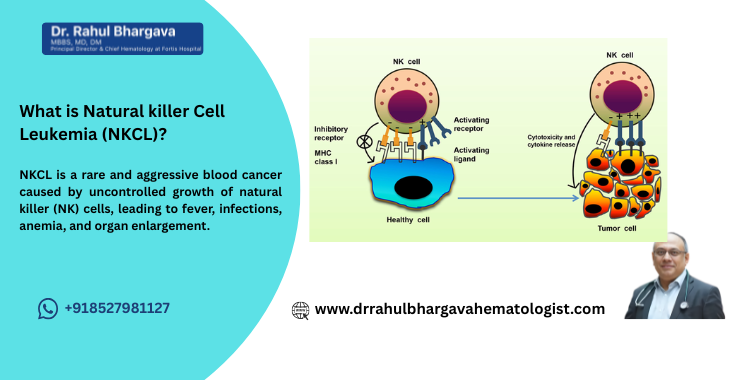Natural killer Cell Leukemia (NKCL) Treatment in India

Natural Killer Cell Leukemia (NKCL) is a rare and aggressive form of leukemia that originates from natural killer (NK) cells, a type of white blood cell that plays a key role in the body's immune response by attacking infected or malignant cells. Unlike other forms of leukemia that typically involve myeloid or lymphoid cells, NKCL involves the uncontrolled proliferation of NK cells. This condition is also known as NK-cell malignancy or aggressive NK-cell leukemia and is characterized by rapid progression and poor prognosis.
NKCL can present as a systemic disease with involvement of bone marrow, liver, spleen, and lymph nodes, and it can manifest in a variety of ways, often with disseminated disease at the time of diagnosis.
Natural Killer (NK) Cell Leukemia
Natural Killer (NK) Cell Leukemia is a rare and aggressive form of leukemia that originates from NK cells, a type of lymphocyte that plays a crucial role in the body’s immune response. This disease is characterized by the rapid proliferation of NK cells, leading to severe immune system dysfunction.
Causes of Natural Killer Cell Leukemia
The exact causes of NK Cell Leukemia are not fully understood. However, several factors are believed to contribute to its development:
- Genetic Mutations: Changes in the genes that regulate NK cells can lead to uncontrolled growth.
- Viral Infections: Infections such as the Epstein-Barr Virus (EBV) have been linked to some cases of NK cell leukemia.
- Environmental Factors: Exposure to certain chemicals and radiation may increase the risk.
Types of NK Cell Leukemia
- Chronic NK Cell Leukemia: A less aggressive form with a slower progression.
- Aggressive NK Cell Leukemia: A highly aggressive form that requires urgent treatment.
Symptoms of Natural Killer Cell Leukemia
The symptoms of NK Cell Leukemia can vary depending on the type and stage of the disease but often include:
- Unexplained fever
- Night sweats
- Fatigue and weakness
- Weight loss
- Enlarged lymph nodes
- Skin rashes or lesions
- Abdominal pain due to an enlarged spleen or liver
Diagnosis of NK Cell Leukemia
Diagnosing NK Cell Leukemia involves a combination of clinical evaluation and specialized tests:
- Blood Tests: To detect abnormal NK cells in the blood.
- Bone Marrow Biopsy: To examine the bone marrow for leukemia cells.
- Immunophenotyping: To identify the specific type of NK cells involved.
- Cytogenetic Analysis: To look for genetic mutations associated with NK cell leukemia.
Treatment Options for NK Cell Leukemia
Treating NK Cell Leukemia requires a multi-disciplinary approach. Dr. Rahul Bhargava and his team offer the following treatment options:
1. Chemotherapy
Chemotherapy is the primary treatment for aggressive NK cell leukemia. It involves using powerful drugs to destroy rapidly growing leukemia cells.
2. Targeted Therapy
Targeted therapy uses drugs that specifically target the genetic mutations or proteins in NK cells, minimizing damage to healthy cells.
3. Stem Cell Transplant
A stem cell transplant may be recommended in severe cases. This procedure involves replacing diseased bone marrow with healthy stem cells to restore normal blood cell production.
4. Immunotherapy
Immunotherapy enhances the body’s immune system to better recognize and attack leukemia cells.
Cost of Treatment and Stay in India
The cost of treating Natural Killer (NK) Cell Leukemia in India is significantly lower compared to Western countries, making it an appealing choice for international patients seeking affordable treatment options. The overall cost can vary based on the severity of the disease, the type of treatment, and the duration of care required. Below is an overview of the cost range for NK Cell Leukemia treatment in India:
-
Initial Consultation:
USD: $30 – $100
INR: ₹2,200 – ₹7,400 -
Blood Tests and Diagnostic Procedures (CBC, Bone Marrow Biopsy, Immunophenotyping, etc.):
USD: $50 – $200
INR: ₹3,700 – ₹14,800 -
Chemotherapy (per cycle):
USD: $400 – $2,700
INR: ₹30,000 – ₹2,00,000 -
Targeted Therapy (per month):
USD: $1,300 – $6,500
INR: ₹1,00,000 – ₹5,00,000 -
Stem Cell Transplant (Bone Marrow Transplant):
USD: $12,000 – $24,000
INR: ₹10,00,000 – ₹20,00,000 -
Hospital Stay (per night):
USD: $25 – $200
INR: ₹2,000 – ₹15,000 per night
India provides world-class medical care with highly skilled professionals, offering advanced treatments for NK Cell Leukemia. The overall treatment cost remains competitive while ensuring quality and timely care, which makes India an attractive option for medical tourism.
Frequently Asked Questions
The survival rate depends on the type and stage of NK Cell Leukemia. Aggressive forms have a lower survival rate, but early diagnosis and treatment can improve outcomes.
While NK Cell Leukemia is challenging to treat, advancements in therapy have made remission possible, especially with early intervention and appropriate treatment.
NK Cell Leukemia specifically affects natural killer cells, which are part of the immune system. It is rarer and more aggressive than other types of leukemia.
Common side effects include fatigue, nausea, hair loss, and increased risk of infections. Dr. Bhargava’s team takes measures to manage and minimize these side effects.